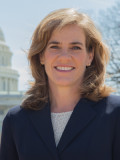
 By General Counsel K. Hollyn Hollman
By General Counsel K. Hollyn Hollman
Even for astute observers, it is difficult to keep up with the rapidly changing legal developments concerning same-sex marriage. Legally, marriage is primarily a state law matter, but federal constitutional decisions and statutes also affect marriage rights. In a relatively short period of time, and by way of a variety of state and federal legislative and court efforts, more than 30 states now allow same-sex marriages. News on this front changes almost daily.
Religious liberty arguments have not been a major factor in cases upholding or striking same-sex marriage laws. The cases have generally been decided under “equal protection” principles.
Religious voices, however, have contributed significantly to the public discussions and debates about marriage — its religious meaning and its legal definition. As the laws regarding marriage continue to change and various conflicts arise, it is a good time to invest in a deeper understanding of our country’s religious liberty and the principle of church-state separation that is one of its important hallmarks. Unfortunately, the context of marriage is one area where the relationship between church and state has been far out of step with that principle.
“Marriage” as a religious institution long predates current marriage laws. Ostensibly, that fact is recognized in the way states have engaged ministers as their agents. States have long used religious entities to perform marriages, literally marrying the concepts of religious and civil marriage. As Fuller Theological Seminary Professor J.R. Daniel Kirk put it: “We have lived so long with pastors saying, ‘… and through the power vested in me by the State of ____ …’ that we don’t even realize how weird that is.”
Through the years, and long before same-sex marriage became a common topic of political debates, I’ve heard Baptist pastors who served on the BJC Board or worked closely with us in some capacity question the role of pastors as agents of the state in marriage ceremonies. Many find ways to avoid or minimize that connection as they perform weddings; some routinely explain the different meanings of marriage during ceremonies. Strong advocates for church-state separation who stand against government efforts to usurp religion through government funding or sponsorship of religious exercises are right to be skeptical about letting the state use them. Many have admirably educated their congregations about the complex, but importantly distinct, roles of the church and the government.
In recent years, some pastors who support civil marriage recognition for same-sex couples protested bans on same-sex marriage by refusing to sign any marriage certificates; they did continue to perform church weddings. Others are now refusing to sign marriage certificates to protest changes in the laws that permit same-sex marriage. In addition to the practical implications for the couple, each decision of a minister in this context affects the church’s witness to the couple being married, those gathered in attendance, and the culture of their community.
Though it would be extremely difficult to fully unravel the tangled relationship between religious and civil marriages that state laws reflect, the BJC welcomes the thoughtful discussion. The good news for religious liberty is that churches remain free to make the autonomous decision about whom to marry — without state interference. Likewise, there are always options for civil marriage that do not include a minister’s signature or religious ceremony. The separation is up to us.
Remarkably, the U.S. Supreme Court has not yet weighed in. At the beginning of this term, the Court surprised advocates on both sides by refusing to take up any of the marriage cases on appeal from the circuits. Then, about a month later, the U.S. Court of Appeals for the 6th Circuit issued a decision upholding a ban on same-sex marriage, creating a split among the circuits that makes a Supreme Court decision more likely. Though it seems inevitable that the Court will eventually have to rule on the issue, it will be a while before we have a decision on the constitutional right to marry. It will be longer still for religious liberty claims related to the recognition of same-sex marriage to settle. In the meantime, churches should decide and make clear whether they are performing marriages by the authority of the state or a greater power.
Other columns on this topic:
Religious liberty and same-sex marriage (May 2013)
Hollman on marriage and freedom (June 2009)
From the November/December 2014 Report From the Capital. Click here to read the next article.




